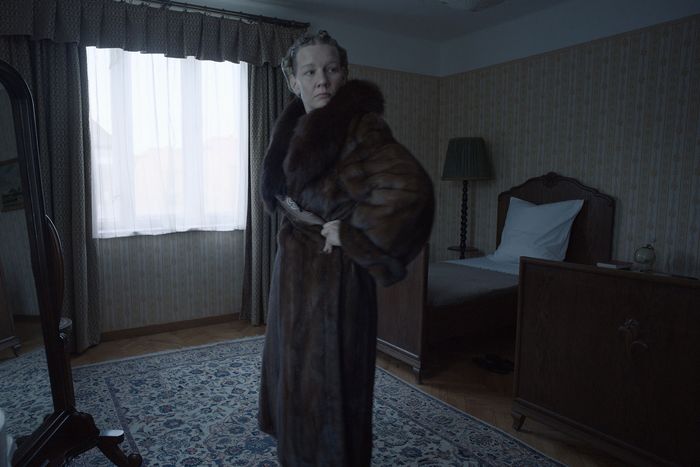
This article originally appeared in Gold Rush, a subscriber-only newsletter about the perpetual Hollywood awards race. Sign up here.
It’s Oscar weekend! You can find my final predictions in all 23 categories here.
When Oscar host Jimmy Kimmel steps out for his monologue on Sunday, you can expect most of the big contenders to get a light roast. There will be jokes about Barbie getting snubbed, Oppenheimer and Killers of the Flower Moon being long, and Bradley Cooper overcommitting for Maestro.
But the whole time Kimmel’s up there, I’ll only be thinking about one thing: How the hell is he going to joke about The Zone of Interest?
For those who haven’t caught up with all the Best Picture nominees, The Zone of Interest follows a husband and wife navigating the normal issues of middle-class life: children, workplace drama, whether it’s worth uprooting a family for better professional opportunities. Except that this particular couple happens to be Rudolf and Hedwig Höss, the S.S. officer in charge of Auschwitz and his wife. The horrors of the Holocaust are never seen directly, only in the smoke from the crematorium next door creeping into the house and human remains interrupting a lovely day out by the river. The slaughter is omnipresent on the soundtrack, but the Hösses never seem to hear it. There is no limit to the evil that humans can ignore.
So you can imagine why this film might be hard to yuk about.
To get a sense of how Kimmel might handle this tricky assignment, I caught up with comedian Jay Jurden, an official Friend of Vulture who’s one of the smartest thinkers about jokes I know. Jay suggested that the safest method might be the meta approach. “The bit of, We can’t joke about this movie, that’s a well you can always go back to,” he said.
Indeed, that’s the strategy earlier Oscar hosts have used when there was a Holocaust movie in the running. Opening the 1994 ceremony, Whoopi Goldberg began by referencing the man who’d emceed the previous four telecasts. “Billy Crystal used to have a terrific way of hosting the show. He’d come out and do a bunch of cute, funny songs about the nominated movies. He got The Crying Game; I got Schindler’s List,” she said, grimacing. “Billy knew when to leave.” Today’s audience might blanch at the implication that The Crying Game was comic gold, but Whoopi’s instincts were correct. Her follow-up — “This year, we discover if Oscar’s last name really is Schindler” — elicited only polite chuckles.
At the 2009 ceremony, Hugh Jackman opened with a purposefully janky musical number (because of the recession). He sang a medley that ran through specific plot points in Slumdog Millionaire, Milk, The Dark Knight, The Curious Case of Benjamin Button, and Frost/Nixon, with Anne Hathaway as Nixon. But when it came time to handle The Reader, for which Kate Winslet would win Best Actress for playing a former guard at Auschwitz, Jackman took a different tack.
“The Reader … I know I need to see The Reader,” he sang while doing an avante-garde version of the Robot. “I even went down to the theater but there was a line / Of all the people watching Iron Man a second time.”
Of course, that’s not to say it’s impossible to write a gag about a Holocaust picture. Bob Hope had an easier go of it at the 1962 ceremony, as that year’s Best Picture nominee handled the subject at a remove, making it fair game. “How about Maximilian Schell getting nominated for Judgment at Nuremberg?” Hope asked. “Wonderful performance, sort of a Swiss Perry Mason.” (His joke immediately before that was better: “Sophia Loren was nominated for Two Women, and I certainly think she is.”)
And, sometimes, there’s a more obvious punch line, anyway. When Steve Martin hosted the 2003 ceremony, he joked that the man who made The Pianist, a biopic of a Polish Holocaust survivor, was in attendance: “Roman Polanski is here … get him!”
Overthinking the Oscar Shorts
For 51 weeks of the year, I occasionally question my place in the universe. But not this week! In the days leading up to the Oscars, I have a clear utility: People need to win their Oscar pools, and it’s my duty to help them.
Unfortunately, at the end of this quest I must face my longtime bête noire — the three Short categories. I actually haven’t done too terribly at predicting them. Last year, I correctly called two out of three, the same score I got in 2020 and 2019. I got a perfect score in 2021, but that was only because my predictions went up a day after everyone else’s, so I could peek. My only face-plant was in 2022, when I blanked completely.
If it feels like I’ve done worse than I have, that’s because the Oscar shorts are by far my least favorite element of the gig. Now, I am not blameless in this scenario: As a born procrastinator, I typically put them off until the last week, then spend a day or two watching the 15 nominees back-to-back-to-back. Seen this way, it is hard not to chafe at their recurring themes of death, dementia, children in peril. You know how sometimes someone will post a clip from a movie on social media to dunk on it, and it’s like, Yeah, of course it looks weird out of context? The Oscar shorts are made entirely out of scenes like these, but there is no context — just hours and hours of garish twists and mawkish sentiment.
To take just one example from this year’s crop: Live-Action Short nominee The After stars David Oyelowo as a harried businessman trying to enjoy a day out in London with his family. He keeps getting called away by Business Stuff … until, suddenly, a black-clad stranger appears out of nowhere, stabs his daughter, then pushes her over a railing. Distraught, Oyelowo’s wife takes a tumble over the railing, too. This happens three minutes into the movie!
Even worse, the qualities I most despise in the Oscar shorts are the ones voters seem to treasure. Every year, I tie myself into knots trying to game it out: Surely *this one* will prove too much even for the Academy. And, of course, that’s the short that ends up winning. My hatred has left me blind.
So this year, I’m switching it up. I am becoming pure logic, throwing my personal feelings aside and making predictions based solely on how closely a nominee hews to the Academy’s favored formula. Is it topical? Is it emotionally manipulative? Does it have a twist? Thus, here are my picks.
Live-Action Short: Red, White, and Blue, which is both timely and has a late-breaking reveal that the Academy should preserve in its museum as the quintessential Oscar Shorts twist.
Animated Short: War Is Over! Inspired by the Music of John and Yoko, which the Next Best Picture podcast described as “Pixar’s 1917.”
Documentary Short: The ABCs of Book Banning, the Oscar Shorts version of this speech from the 2004 Democratic convention.
The saddest words in the English language are: “Maybe this time things will be different.” But maybe this time things will be different!
The Bitchiest Lines in the Anonymous Oscar Ballots
A much more enjoyable hallmark of this week is the bloom of anonymous Oscar ballots across the web. The Hollywood Reporter’s “Brutally Honest Oscar Ballot” series paved the way by offering the most reliably reactionary Academy members a place to spill their ugliest opinions on the year’s nominees. But as other outlets have gotten into the game, there’s now a seat at the table for haters of all stripes. Here are the meanest lines from this year’s editions:
11. “The ABCs of Book Banning — the point is great, but come on, it’s a glorified slideshow.” (THR)
10. “My stance on Christopher Nolan is: I’m not going to watch his rough cuts anymore until he finds a real editor to cut it down. It’s bananas.” (Entertainment Weekly)
9. “Carey Mulligan was great [in Maestro], but Felicia was more glamorous than her.” (Indiewire)
8. “I didn’t care for The Zone of Interest. It came out of the gate so acclaimed, I had high expectations, and I found the film incredibly self-indulgent.” (Entertainment Weekly)
7. “Cillian Murphy was almost Asperger in Oppenheimer, which he probably was.” (Indiewire)
6. “When you listen to the Jon Batiste song outside of [American Symphony], it’s a horrible song.” (Indiewire)
5. “I didn’t like May December. I got distracted when looking at the house. How can somebody who bakes occasionally and a guy who’s an X-ray technician afford this house?” (Indiewire)
4. “I don’t get Lily Gladstone. I’ve seen her in other things, and this performance [in Killers of the Flower Moon] didn’t stretch her past what I’ve seen her do in other places … I don’t think she brought complexity to it.” (Indiewire)
3. “I did not bother to see Maestro. Two people I trust in the industry told me very strongly, ‘Don’t waste your time,’ so I didn’t.” (Next Best Picture)
2. “I was waiting for this big monologue [in Barbie] … and I was like, we know this … We know all these things. I turned and the woman next to me was sobbing, so I was like, okay, you didn’t take any women’s studies classes in college.” (Entertainment Weekly)
1. “If you’re going to go so far with the makeup and prosthetics [in Maestro], God forbid Bradley Cooper cover up his piercing, beautiful blue eyes to be accurate. I don’t think Leonard Bernstein had blue eyes. I think he famously did not. That was such an actor’s vanity show.” (Entertainment Weekly)
Links!
– There are just over 48 hours to go before the Oscars. For those who’ve left it late and don’t need to sleep, here’s how to watch and stream all the nominees.
– Behind Neon’s big bet on international cinema.





